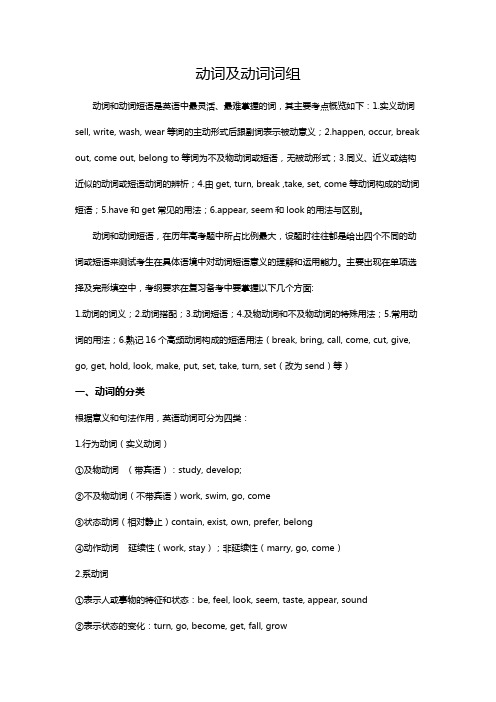英语语法之动词
- 格式:doc
- 大小:134.50 KB
- 文档页数:7

小学英语语法-动词动词的定义动词是指表示动作、状态、发生的词类。
它是英语句子的核心部分,可以用来表达人或事物所做的事情或所处的状态。
动词的分类动词可以分为以下几类:1. 行为动词:表示人或事物所做的动作,如run(跑)、sing (唱)等。
2. 非行为动词:表示人或事物的状态或存在,如be(是)、have(有)等。
3. 情态动词:表示说话人的情感、意愿、能力等,如can (能)、must(必须)等。
动词的时态动词的时态可以分为以下几种:1. 现在时:表示目前正在进行的动作或常规的动作,如play (玩)、eat(吃)等。
2. 过去时:表示过去发生的动作或状态,如ran(跑过)、ate (吃过)等。
3. 将来时:表示将来将要发生的动作或状态,如will play(将要玩)、will eat(将要吃)等。
动词的变化形式动词在不同的时态中会有不同的变化形式,如:1. 现在时的第三人称单数形式:在现在时中,当主语是第三人称单数(he、she、it)时,动词要加上-s或-es。
例如:She plays football(她踢足球)。
2. 过去式的变化形式:在过去时中,一般情况下,动词要加上-ed或-d。
例如:They played together yesterday(昨天他们一起玩)。
3. 现在分词和过去分词的形式:现在分词一般以-ing结尾,过去分词一般以-ed结尾。
例如:He is swimming in the pool(他正在游泳)。
以上是关于小学英语动词的基本知识,希望能对您有所帮助。
参考资料:。


动词及动词词组动词和动词短语是英语中最灵活、最难掌握的词,其主要考点概览如下:1.实义动词sell, write, wash, wear等词的主动形式后跟副词表示被动意义;2.happen, occur, break out, come out, belong to等词为不及物动词或短语,无被动形式;3.同义、近义或结构近似的动词或短语动词的辨析;4.由get, turn, break ,take, set, come等动词构成的动词短语;5.have和get常见的用法;6.appear, seem和look的用法与区别。
动词和动词短语,在历年高考题中所占比例最大,设题时往往都是给出四个不同的动词或短语来测试考生在具体语境中对动词短语意义的理解和运用能力。
主要出现在单项选择及完形填空中,考纲要求在复习备考中要掌握以下几个方面:1.动词的词义;2.动词搭配;3.动词短语;4.及物动词和不及物动词的特殊用法;5.常用动词的用法;6.熟记16个高频动词构成的短语用法(break, bring, call, come, cut, give, go, get, hold, look, make, put, set, take, turn, set(改为send)等)一、动词的分类根据意义和句法作用,英语动词可分为四类:1.行为动词(实义动词)①及物动词(带宾语):study, develop;②不及物动词(不带宾语)work, swim, go, come③状态动词(相对静止)contain, exist, own, prefer, belong④动作动词延续性(work, stay);非延续性(marry, go, come)2.系动词①表示人或事物的特征和状态:be, feel, look, seem, taste, appear, sound②表示状态的变化:turn, go, become, get, fall, grow③表示某种状态的延续或持续:remain, keep, stay3.助动词(与动词原形或分词构成复合谓语):be(am,is,are),do(does,did);have(has);will,would,shall4.情态动词:can(could),may(might),must,shall(should)二、动词及动词短语(一)动词词义辨析动词是是各类考试的重点,高考试题中,单项填空、完形填空和改错等三项题型中,动词辨义的比重较大,并逐年增加。


英语语法之动词专项汇总英语词性概括:英语词性又能分成2个大类:1)开放类:名词、动词、形容词、副词2)封闭类:代词、介词、连词、冠词、感叹词区分起来也很简单,开放类词会随着语言的发展而出现新增和替换,比如每天都会有新的名词出现;而封闭类词语则基本上不会有变化,如连词、介词却基本不会有变换。
我花很多时间来收集整理归纳和全方位汇总英语的词汇和语法,希望我的文章能提供所有英语爱好者在英语学习所需要的信息,不用到处去寻找相关信息。
动词是英语词汇中非常重要的词类,我花了很多时间归纳和汇集了动词的所有类别,包括实义动词,情态动词,助动词和系动词;并详解它们的用法和应该避免的坑,最后归纳了动词的过去式和过去分词的规则变化和不规则变化。
适用于所有的英语爱好者,从小学生到初高中和大学生等,看这文足够也。
今后将更多在语法功能上介绍动词,包括动词的时态和句型。
一:动词的种类⑴行为动词又称实义动词:含有实在的意义,表示动作或状态,在句中能独立作谓语。
分为及物动词和不及物动词,及物动词后必须带宾语。
eg:have, read, use, pass, watch。
不及物动词后不直接带宾语。
eg:come, go, listen⑵连系动词:有一定的词义,但词义不完整,不能单独作谓语,必须与表语一起作谓语。
eg:be, look, get, become, turn⑶助动词:本身没有词义,不能单独作谓语,只能和实义动词一起构成谓语,表示时态、语态、否定、疑问等。
eg:be, have, do, will, shall⑷情态动词:本身有一定词义,不能单独作谓语,只能和实义动词一起构成谓语,表示说话人的语气和情态,没有人称和数的变化。
如:can, may, must, need, should, ought to, had better二、实义动词实义动词又叫行为动词,表示动作的动词。
实义动词与系动词是相对的,能独立用作谓语。
它分为及物动词和不及物动词两种:及物动词是指后面要求有直接宾语的动词;不及物动词指后面不需要跟宾语的动词。

英语语法英语语法——————动词动词主编:汤敏英语语法英语语法——————动词动词主编:汤敏动词1.1.概说概说1)动词(verb)是表示动作或状态的词。
a)表示动作:swim 游泳push 推b)表示状态:have 有be 是2)英语动词有时态、语态、语气等形式上的变化。
2.限定动词和非限定动词从是否被主语所限定来分,动词有限定动词(finite verb)和非限定动词(nonfinite verb)两大类。
1)限定动词限定动词用作句子的谓语动词,并被主语所限定,有人称和数的变化。
如:He is a tractor driver.他是一个拖拉机手。
Facts are more eloquent than words.事实胜于雄辩。
We have friends all over the world.我们的朋友遍天下。
An apple falls by the force of gravitation.地心吸力使苹果落地。
2)非限定动词非限定动词有动词不定式、动名词和分词三种,在句子里都不能单独作谓语动词,故不被主语所限定,没有人称和数的变化。
如:I am pleased to meet you.我很高兴与你相识。
(动词不定式)Smoking is harmful to the health.吸烟对身体有害。
(动名词)I heard them singing the Internationale 。
我听见他们唱《国际歌》。
(分词)Spoken words are often more powerful than writing.语言往往比文字更有力。
(分词)3.实义动词、连系动词、情态动词和助动词从其含义来分,动词有实义动词(notional verb),连系动词(1ink verb),情态动词(modal verb)和助动词(auxiliary verb)四类。
1)实义动词实义动词有完全的词义,并能独立作谓语动词。
英语语法之动词的分类一.be动词am、is、are、was、were、been、being二.助动词do、does、did will、shall、would have、has、had 三.情态动词can、may、must、should + 动词原形考点一:对情态动词的肯定否定回答Can/May l ... ? can’t/mustn’tMust/Need I ... ? must/needn’t考点二:表推断must be、may be、might be、can’t be四.实义动词(1)系动词+a. 构成系表结构①感官动词:look、feel、smell、taste、sound、seen②表变化:turn、grow、get、go、become③固定搭配:fall asleep、feel sleepy、get ready、get married注意:1.无被动 2.不延续(2)及物动词与不及物动词1.定义:后面必须跟宾语意义才完整的叫及物动词;本身意义完整,后面不需跟宾语的叫不及物动词。
2.及物动词可直接加宾语、双宾及复合宾语复合宾语:sb./sth.+a./动词原形作宾补动词原形包括let make have sb. do双宾:... sb. sth./sth. for/to sb.b uy/getprovide/supply ... sb. sth./sth. for sb. makecookasktellforceadvice sb. dopromisewishsee sb. doing/ do sth.hear sb. doing/ do sth.watch sb. doing/ do sth.notice sb. doing/ do sth.注意:变被动要加to。
keep/makefind/feel/thinkwish。
2023年初中英语语法之实义动词与感官动词的用法解析基础英语学习之实义动词用法实义动词意思完全,能独立用作谓语。
实义动词有及物动词和不及物动词(及物动词是指后面要求有直接宾语的动词;不及物动词指后面不需要跟宾语的动词) 即行为动词,表示动作的动词。
1.及物动词要求有宾语①Mr.Smith gave his wife twenty pounds for her birthday.史密斯先生给了他的妻子20英镑过生日。
②He asked the teacher a few questions.他向老师问了几个问题。
③We have friends all over the world.我们的朋友遍天下。
④Children and young people like bright colors.孩子和年轻人喜欢亮丽的颜色。
2.不及物动词不要求有宾语① Most shops in Britain open at 9:00 A.m. and close at 5:00 or 5:30 in the evening .英国大部分商店九点开门,晚五点或五点半关门。
②George's father lives there.乔治的爸爸住在那里。
③Let's go home.我们回家吧。
④The examination ended at 11:30 A.m.考试上午十一点半结束。
3.特殊实义动词英语动词很多既是及物动词又是不及物动词,如close, begin, study, leave, work等。
①The post office closes at 9:00 p. m.邮局晚上9点关门。
②Close the window,please.请关窗。
③Shall we begin now?我们现在开始吗?④ Bill began working as a sailor after he left school.比尔毕业后当水手。
高中英语语法总结大全之动词的时态一般现在时的用法1)经常性或习惯性的动作,常与表示频腮度的时间状语连用。
时间状语:every…,sometimes,at…,onSundayIleavehomeforschoolat7everymorning.2)客观真理,客观存在,科学事实。
Theearthmovesaroundthesun.ShanghailiesintheeastofChina.3)表示格言或警句中。
Pridegoesbeforeafall.骄者必败。
注意:此用法如果出现在宾语从句中,即使主句是过去时,从句谓语也要用一般现在时。
例:Columbusprovedthattheearthisround..4)现在时刻的状态、能力、性格、个性。
Idon'twantsomuch.AnnWangwritesgoodEnglishbutdoesnotspeakwell.比较:NowIputthesugarinthecup.Iamdoingmyhomeworknow.第一句用一般现在时,用于操作演示或指导说明的示范性动作,表示言行的瞬间动作。
再如:Nowwatchme,Iswitchonthecurrentandstandback.第二句中的now是进行时的标志,表示正在进行的动作的客观状况,所以后句用一般现在时。
一般过去时的用法1)在确定的过去时间里所发生的动作或存在的状态。
时间状语有:yesterday,lastweek,anhourago,theotherday,in1982等。
Wheredidyougojustnow?2)表示在过去一段时间内,经常性或习惯性的动作。
WhenIwasachild,Ioftenplayedfootballinthestreet.WhenevertheBrownswentduringtheirvisit,theyweregivenawarmwelcome.3)句型:Itistimeforsb.todosth"到……时间了""该……了"Itistimesb.didsth."时间已迟了""早该……了"Itistimeforyoutogotobed.你该睡觉了。
1 系动词系动词亦称联系动词(Link Verb),作为系动词,它本身有词义,但不能单独用作谓语,后边必须跟表语(亦称补语),构成系表结构说明主语的状况、性质、特征等情况。
说明:有些系动词又是实义动词,该动词表达实义时,有词义,可单独作谓语。
例如:He fell ill yesterday. 他昨天病了。
(fell是系动词,后跟补足语,说明主语情况。
)He fell off the ladder. 他从梯子上摔下来。
fell是实义动词,单独作谓语。
1)状态系动词用来表示主语状态,只有be一词。
例如:He is a teacher. 他是一名教师。
(is与补足语一起说明主语的身份。
)2)持续系动词用来表示主语继续或保持一种状况或态度,主要有keep, rest, remain, stay, lie, stand。
例如:He always kept silent at meeting. 他开会时总保持沉默。
This matter rests a mystery. 此事仍是一个谜。
3)表像系动词用来表示"看起来像"这一概念,主要有seem, appear, look。
例如:He looks tired. 他看起来很累。
He seems (to be) very sad. 他看起来很伤心。
4)感官系动词感官系动词主要有feel, smell, sound, taste。
例如:This kind of cloth feels very soft. 这种布手感很软。
This flower smells very sweet. 这朵花闻起来很香。
5)变化系动词这些系动词表示主语变成什么样,变化系动词主要有become, grow, turn, fall, get, go, come, run。
例如:He became mad after that. 自那之后,他疯了。
She grew rich within a short time. 她没多长时间就富了。
6)终止系动词表示主语已终止动作,主要有prove, turn out, 表达"证实","变成"之意。
例如: The rumor proved false. 这谣言证实有假。
The search proved difficult. 搜查证实很难。
His plan turned out a success. 他的计划终于成功了。
(turn out表终止性结果)5.2 助动词1)协助主要动词构成谓语动词的词叫助动词。
被协助的动词称作主要动词。
助动词自身没有词义,不可单独使用。
例如:He doesn't like English. 他不喜欢英语。
(doesn't是助动词,无词义;like是主要动词,有词义)2)助动词协助主要动词完成以下功用,可以用来:a. 表示时态。
例如:He is singing. 他在唱歌。
He has got married. 他已结婚。
b. 表示语态。
例如:He was sent to England. 他被派往英国。
c. 构成疑问句。
例如:Do you like college life? 你喜欢大学生活吗?Did you study English before you came here? 你来这儿之前学过英语吗?d. 与否定副词not合用,构成否定句。
例如:I don't like him. 我不喜欢他。
e. 加强语气。
例如:Do come to the party tomorrow evening. 明天晚上一定来参加晚会。
He did know that. 他的确知道那件事。
3)最常用的助动词有:be, have, do, shall, will, should, would等。
5.3 助动词be的用法1) be +现在分词,构成进行时态。
例如:They are having a meeting. 他们正在开会。
English is becoming more and more important. 英语现在越来越重要。
2)be + 过去分词,构成被动语态。
例如:The window was broken by Tom.. 窗户是汤姆打碎的。
English is taught throughout the world. 世界各地都教英语。
3) be + 动词不定式,可表示下列内容:a. 表示最近、未来的计划或安排。
例如:He is to go to New York next week.. 他下周要去纽约。
We are to teach the freshmen. 我们要教新生。
说明:这种用法也可以说成是一种将来时态表达法。
b. 表示命令。
例如:You are to explain this. 对此你要做出解释。
He is to come to the office this afternoon. 要他今天下午来办公室。
c. 征求意见。
例如:How am I to answer him? 我该怎样答复他?Who is to go there? 谁该去那儿呢?d. 表示相约、商定。
例如:We are to meet at the school gate at seven tomorrow morning. 我们明天早晨7点在校门口集合。
5.4 助动词have的用法1)have +过去分词,构成完成时态。
例如:He has left for London. 他已去了伦敦。
By the end of last month, they had finished half of their work. 上月未为止,他们已经完成工作的一半。
2)have + been +现在分词,构成完成进行时。
例如:I have been studying English for ten years. 我一直在学英语,已达十年之久。
3)have +been +过去分词,构成完成式被动语态。
例如:English has been taught in China for many years. 中国教英语已经多年。
5.5 助动词do 的用法1)构成一般疑问句。
例如:Do you want to pass the CET? 你想通过大学英语测试吗?Did you study German? 你们学过德语吗?2)do + not 构成否定句。
例如:I do not want to be criticized. 我不想挨批评。
He doesn't like to study. 他不想学习。
In the past, many students did not know the importance of English.过去,好多学生不知道英语的重要性。
3)构成否定祈使句。
例如:Don't go there. 不要去那里。
Don't be so absent-minded. 不要这么心不在焉。
说明:构成否定祈使句只用do,不用did和does。
4)放在动词原形前,加强该动词的语气。
例如:Do come to my birthday party. 一定来参加我的生日宴会。
I did go there. 我确实去那儿了。
I do miss you. 我确实想你。
5)用于倒装句。
例如:Never did I hear of such a thing. 我从未听说过这样的事情。
Only when we begin our college life do we realize the importance of English. 进了大学以后,我们才认识到英语的重要性。
说明:引导此类倒装句的副词有never, seldom, rarely, little, only, so, well等。
6)用作代动词。
例如:---- Do you like Beijing? --你喜欢北京吗?---- Yes, I do. --是的,喜欢。
(do用作代动词,代替like Beijing.)He knows how to drive a car, doesn't he? 他知道如何开车,对吧?5.6 助动词shall和will的用法shall和will作为助动词可以与动词原形一起构成一般将来时。
例如:I shall study harder at English. 我将更加努力地学习英语。
He will go to Shanghai. 他要去上海。
说明:在过去的语法中,语法学家说shall用于第一人称,will 只用于第二、第三人称。
现在,尤其是在口语中,will常用于第一人称,但shall只用于第一人称,如用于第二、第三人称,就失去助动词的意义,已变为情态动词,试比较:He shall come. 他必须来。
(shall有命令的意味。
)He will come. 他要来。
(will只与动词原形构成一般将来时。
)5.7 助动词should, would的用法1)should无词义,只是shall的过去形式,与动词原形构成过去将来时,只用于第一人称。
例如:I telephoned him yesterday to ask what I should do next week. 我昨天给他打电话,问他我下周干什么。
比较:"What shall I do next week?" I asked. "我下周干什么?"我问道。
可以说,shall变成间接引语时,变成了should。
2) would也无词义,是will的过去形式,与动词原形构成过去将来时,用于第二、第三人称。
例如: He said he would come. 他说他要来。
比较:"I will go," he said. 他说:"我要去那儿。
"变成间接引语,就成了He said he would come。
原来的will变成would,go变成了come.。
5.8 短语动词动词加小品构成的起动词作用的短语叫短语动词。
例如:Turn off the radio. 把收音机关上。
(turn off是短语动词)短语动词的构成基本有下列几种:1)动词+副词,如:black out;2)动词+介词,如:look into;3)动词+副词+介词,如:look forward to。
构成短语动词的副词和介词都统称为小品词。
5.9 非谓语动词在句子中充当除谓语以外的句子成分的动词形式叫做非谓语动词。
非谓语动词分为三种形式:不定式,动名词,和分词(分词包括现在分词和过去分词)。